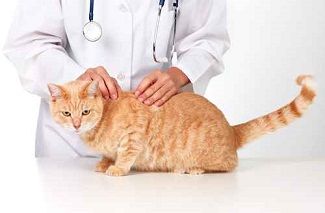Clinical Trial Shows Promise for FIP Treatment
Feline infectious peritonitis may have met its match. A new clinical trial has shown the effectiveness of an antiviral drug in treating this typically fatal disease.

Researchers have spent years searching for a cure for feline infectious peritonitis (FIP)—an uncommon, but usually fatal, immune response to feline coronavirus (FCoV). And now, a new clinical trial is believed to have made a treatment breakthrough.
Researchers from Kansas State University and the University of California, Davis, came together to investigate whether a novel antiviral drug could cure cats with FIP. Study results were published in the Journal of Feline Medicine and Surgery.
"This research is the first attempt to use modern antiviral strategies to cure a fatal, systemic viral disease of any veterinary species," said Niels Pedersen, BS, DVM, PhD, from UC Davis School of Veterinary Medicine and co-lead researcher of the clinical trial. "Our task was to identify the best candidates for antiviral treatment, and the best dose and duration of treatment.”
RELATED:
- Treatment for Feline Infectious Peritonitis on the Horizon?
- Field Trial of Polyprenyl Immunostimulant in Cats with Noneffusive Feline Infectious Peritonitis
Study Design
The study, which was launched in March 2016, included 20 client-owned cats with various forms and stages of FIP (14 cats presented with wet or dry-to-wet FIP, 6 cats with dry FIP). Each cat was given the 3C-like protease inhibitor GC376 antiviral drug every 12 hours at a dose of 15 mg/kg subcutaneously.
After starting treatment, each cat was evaluated at least twice daily for rectal temperature, pulse, respiration, appetite, and activity, along with routine blood testing. Cats were then discharged to their owners once a positive treatment effect was noted, usually within 5 days after receiving treatment.
Owners were then instructed on how to administer the antiviral drug twice daily, along with how to keep daily logs of their cats’ progress.
Results
According to the study, a dramatic and progressive improvement in health was observed in 19 of the 20 cats during the first 1 to 4 weeks of treatment. Seven of the 20 cats were also categorized as potential treatment successes based on more than 12 weeks of disease remission.
"We found that most of [the] cats, except for those with neurological disease, can be put into clinical remission quickly with antiviral treatment, but achieving long-term remission is challenging with chronic cases,” said Yunjeong Kim, DVM, PhD, DACVM, from Kansas State University College of Veterinary Medicine and co-lead researcher of the clinical trial.
Kittens younger than age 16 to 18 weeks with acute-onset wet FIP or dry FIP limited to a mesenteric lymph node showed the best long-term treatment response in the trial. While the drug seemed to slow the progression of FIP in cats with neurologic disease, none of these cats achieved remission.
Implications
“These findings give us more insight into FIP pathogenesis and also underscore the importance of early diagnosis and early treatment,” Dr. Kim said.
While only one-third of the cats that participated in the clinical trial were long-term survivors, the authors believe their work provides a basis for future studies with this antiviral drug and other similar drugs that will eventually follow.
Even if only for a few weeks or months, all cats did return to normal health after receiving treatment with this antiviral drug.
“Saving or improving the lives of even a few cats is a huge win for FIP research,” Dr. Pedersen said.